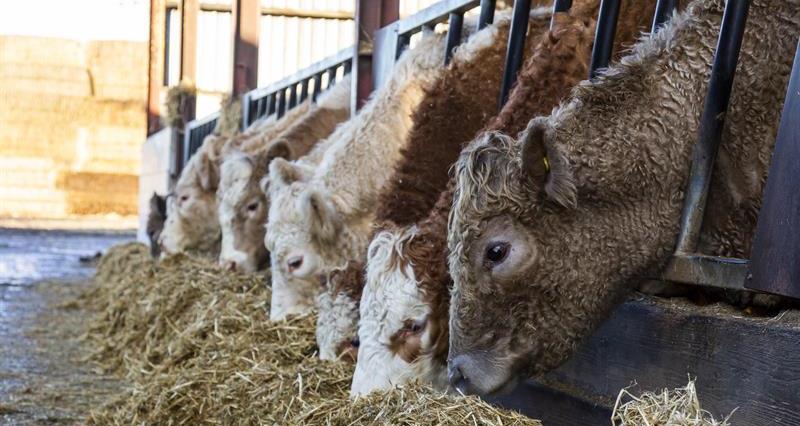Methane suppressing feed products – Defra commits to introduction
30 October 2023

Defra has reaffirmed its interest in the use of methane suppressing feed products and has said that it is committed to working with industry to “encourage uptake of these products”
26 October 2023
Defra commit to the use of methane suppressing feed products
Following the call for evidence, Defra has renewed its commitment to reducing methane emissions in livestock through plans to incentivise the use of methane suppressing feed products in England.
In its response, Defra also outlined plans to incentivise the use of high efficacy products and promised to work closely with industry to introduce this.Â
The news has been welcomed by NFU Deputy President Tom Bradshaw, however he says that methane suppressing feed products are just “one piece of the puzzle”, which need to work alongside a range of other methane reducing techniques.
Some of the concerns raised by Tom include the impact of additional input costs, ensuring credible certification and widespread availability, to finding solutions to inconsistent and unequal intake by cattle in grazing systems.
You can read the full announcement and the NFU reaction at: Defra commit to introducing the use of methane suppressing feed in England
24 October 2022
NFU submits response to Defra consultation
»ĘĽŇ»ŞČËhas submitted its response to Defra's call for evidence on methane suppressing feed products.
Within the response, the NFU has reported on members awareness of feed products, opinions on their usage and shared concerns on implementing such feed products into current farm management systems.Â
»ĘĽŇ»ŞČËhas also called on Defra to consider other methane reducing techniques and asked that efforts are not solely concentrated on feed additives, especially since there are still concerns about how they would work on the majority of UK farms, such as whether the consistency of uptake can be guaranteed in grazing systems.
Awareness of feed products
In the call for evidence, members reported a general awareness surrounding methane suppressing feed additives, although there was very limited knowledge expressed surrounding how products worked, how and in what quantities these are fed, and health and welfare implications. However, members did report being well aware of the opportunities surrounding feed additives.Â
Several members reported already using particular feed additives, mainly citrus peels. However, this was mainly used due to the product price.
It was also reported that feed companies are already offering additional products to be included within feed rations, for an additional cost that claimed they would reduce the methane emissions of their cattle. These claims were not validated, the compound being used was not clear and were being offered with little additional information.
Opinions on the use of methane suppressing additives
Members had mixed feelings around the use of these products. There were lots of concerns around
health and welfare implications of using these products, such as reported damage from seaweed to the rumen.
Consumer perceptions were also raised as a potential concern, both to the use of additives in feeding regimes but also when it comes to the importance of methane mitigation in the sector.
The use of methane suppressing feed additives was generally seen as a potential future tool that could be utilised if incentives were correct.
The ability to incorporate the feed into a range of farm management systems was seen as the main blocker to the introduction of these products on farm, solutions need to be found that will work for grazing livestock.
Certification and efficacy of a product are also important to make sure the methane reductions can be verified and that products aren’t sold under false claims.
The cost of the product and the added benefits of its use on farm could either be an incentive or a barrier to use. It was noticed that producers continue to operate on very tight margins and do not have the capacity to add in products unless they help to produce a return.
Further research
»ĘĽŇ»ŞČËhas expressed an interest in further research to support the development of practical options for grazing livestock, eg. boluses, water based products such as Rumin8 or other types of long term administration or how they could be introduced to our grassland through tannins and other methods.
The opportunity for reducing methane emissions through breeding and genetic improvement should also not be discounted or overtaken by feed additives and should be carefully considered when creating future policy.
A full summary of responses can be found at:
7 September 2022
Give your views on methane suppressing feed products
Defra is calling for evidence on the potential of the range of methane-reducing feed additives in UK agriculture. The 21 question online survey asks you to tick boxes about:
- your awareness and perception of these additives
- the current role of feed additives within our farming systems
- the potential barriers that could prevent their introduction in both the short and long-term
- how uptake could best be driven – by government interventions, industry or voluntary-led solutions, and what might these interventions might look like.
You can find out more information and fill in the Defra consultation on the .
If you want to send your views in to us, email NFU livestock adviser Harriet Henrick.
The consultation closes on 15th November.
Read Methane Reducing Feed Additives Table – the story so far
A draft NFU response will be available on »ĘĽŇ»ŞČË in the second half of October.